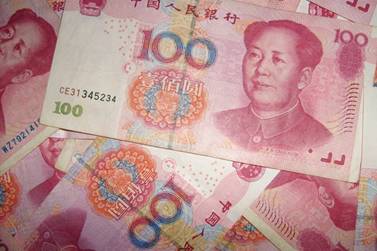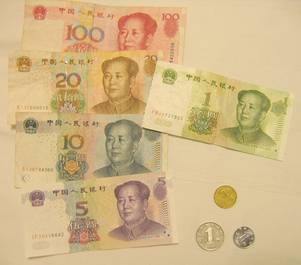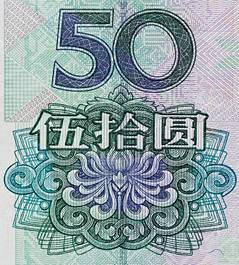The Chinese currency is the Ren Min Bi (the People’s currency). It is also known as the Yuan, or more colloquially, the Kuai, but its official abbreviation is CNY. It is the official currency used in the People’s Republic of China. Keep in mind, the RMB is not used in Macao or Hong Kong but is easily exchangeable there. Both of these special administrative regions have their own monies, the Hong Kong dollar and the Macanese pataca. The Chinese RMB is colorful and divided into denominations of ten. Notes come in 1, 5, 10, 20, 50, and 100 Yuan. One Yuan is divided into 10 Jiao, sometimes referred to as Mao; they can come in paper or in coin form. One Jiao is divided into 10 Fen which people usually don't bother giving you because they are essentially tinsel and more annoying than useful because you can't actually spend them except at supermarkets.

Photo: Peter Griffin
The RMB isn’t traded on international markets, but surprisingly enough can be changed in some areas of Southeast Asia like Thailand and Vietnam. Changing money in China is not as easy as changing money in other countries, however. In many places in Southeast Asia, there are money changing stations or you can simply do it at your hostel or at a travel agency and at all hours of the day. In China, you can only change money at the airport, banks, or bank desks at your hotel during regular banking hours. Be aware that not all banks change money, so your best bet is the Bank of China. The best way to travel around in China is with a combination of money sources including cash, credit cards, and a traveler’s check card.
While China is an extremely safe country in comparison to other places in Asia or even worldwide, it’s good to be careful with your money. Get a money belt to go under your clothes for your passport and credit cards and don’t keep everything in one place. Never carry a “fanny–pack” or “bum-bag”; that's pretty much the easiest possible way to get pick-pocketed on the subway. If you are just hanging out in the city, it’s not as convenient to carry a money belt so you may just want to use your wallet, but on trains and on subways be mindful of your money and valuables at all times.

Photo: Bazza
Fake Money:
Be aware that counterfeit currencies are a problem in China; so do not change your money in places other than official banks or establishments. There are people on the black market who might offer a better exchange rate, but it’s best not to use illegal means and you would might get fake money because you probably don't know any better. As a tip, it’s best to try to carry smaller bills for the most part as getting change in China seems to be a huge hassle for everyone involved; especially taxis, who will sigh, moan, and whine, then proceed to open up a glove box with 700 Kuai in 1s, 5s, and 10s. No one in China ever seems to have any change ever so it’s amazing to wonder what happened to all that money that was earned the day before in the restaurant. Taxis are notorious for giving fake change, and the most common fake bill in my experience is the 50 Yuan note. They will usually pass it to you then try to rush you out of the cab. Other times, bartenders will pass them off to you in a rush while you unsuspectingly put it into your wallet.

Photo: Adrian Bartel
There are a couple of obvious things to check for:
Mao’s raised collar has a texture on the real notes.
The real bills have a watermark when you raise them to the light.
The texture of the notes (real or fake) themselves is slippery and not like regular paper.
For more information about the pros and cons of cash, credit cards, and traveler’s checks, check back for the second part of our practical information on money in China. We will help inform you on what is the safest and most reliable way to get money in China.
***
Expat Corner> Detecting Fake Bank Notes
China Explorer> Practical information: Getting to China
China Explorer> Questions and Answers Section
Warning:The use of any news and articles published on eChinacities.com without written permission from eChinacities.com constitutes copyright infringement, and legal action can be taken.
All comments are subject to moderation by eChinacities.com staff. Because we wish to encourage healthy and productive dialogue we ask that all comments remain polite, free of profanity or name calling, and relevant to the original post and subsequent discussion. Comments will not be deleted because of the viewpoints they express, only if the mode of expression itself is inappropriate.
Please login to add a comment. Click here to login immediately.